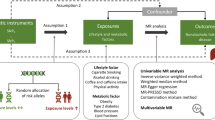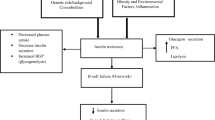Abstract
Adiponectin is an adipose tissue specific protein that is decreased in subjects with obesity and type 2 diabetes. The objective of the present study was to examine whether variants in the regulatory regions of the adiponectin gene contribute to type 2 diabetes in Asian Indians. The study comprised of 2,000 normal glucose tolerant (NGT) and 2,000 type 2 diabetic, unrelated subjects randomly selected from the Chennai Urban Rural Epidemiology Study (CURES), in southern India. Fasting serum adiponectin levels were measured by radioimmunoassay. We identified two proximal promoter SNPs (−11377C→G and −11282T→C), one intronic SNP (+10211T→G) and one exonic SNP (+45T→G) by SSCP and direct sequencing in a pilot study (n = 500). The +10211T→G SNP alone was genotyped using PCR-RFLP in 4,000 study subjects. Logistic regression analysis revealed that subjects with TG genotype of +10211T→G had significantly higher risk for diabetes compared to TT genotype [Odds ratio 1.28; 95% Confidence Interval (CI) 1.07–1.54; P = 0.008]. However, no association with diabetes was observed with GG genotype (P = 0.22). Stratification of the study subjects based on BMI showed that the odds ratio for obesity for the TG genotype was 1.53 (95%CI 1.3–1.8; P < 10−7) and that for GG genotype, 2.10 (95% CI 1.3–3.3; P = 0.002). Among NGT subjects, the mean serum adiponectin levels were significantly lower among the GG (P = 0.007) and TG (P = 0.001) genotypes compared to TT genotype. Among Asian Indians there is an association of +10211T→G polymorphism in the first intron of the adiponectin gene with type 2 diabetes, obesity and hypoadiponectinemia.


Similar content being viewed by others
References
Abate N, Chandalia M, Snell PG, Grundy SM (2004) Adipose tissue metabolites and insulin resistance in non-diabetic Asian Indian men. J Clin Endocrinol Metab 89:2750–2755
Alberti KG, Zimmet PZ (1998) Definition, diagnosis and classification of diabetes mellitus and its complications. Part 1: diagnosis and classification of diabetes mellitus, provisional report of a WHO consultation. Diabet Med 15:539–553
Berthier MT, Houde A, Cote M, Paradis AM, Mauriege P, Bergeron J, Gaudet D, Despres JP, Vohl MC (2005) Impact of adiponectin gene polymorphisms on plasma lipoprotein and adiponectin concentrations of viscerally obese men. J Lipid Res 46:237–244
Comuzzie AG, Funahashi T, Sonnenberg G, Martin LJ, Jacob HJ, Black AE, Maas D, Takahashi M, Kihara S, Tanaka S, Matsuzawa Y, Blangero J, Cohen D, Kissebah A (2001) The genetic basis of plasma variation in adiponectin, a global endophenotype for obesity and the etabolic syndrome. J Clin Endocrinol Metab 86:4321–4325
Daimon M, Oizumi T, Saitoh T, Kameda W, Hirata A, Yamaguchi H (2003) Decreased serum levels of adiponectin are a risk factor for the progression to type 2 diabetes in the Japanese Population: the Funagata study. Diabetes Care 26:2015–2020
Deepa M, Pradeepa R, Rema M, Mohan A, Deepa R, Shanthirani S, Mohan V (2003) The Chennai Urban Rural Epidemiology Study (CURES) study design and methodology (urban component) (CURES-1). J Assoc Physicians India 51:863–870
Devlin B, Roeder K, Wasserman L (2001) Genomic control, a new approach to genetic-based association studies. Theor Popul Biol 60:155–166
Diez JJ, Iglesias PB (2003) The role of the novel adipocyte-derived hormone adiponectin in human disease. Eur J Endocrinol 148:293–300
Gibson F, Froguel P (2004) Genetics of the ADIPOQ locus and its contribution to Type 2 diabetes susceptibility in French Caucasians. Diabetes 53:2977–2983
Gu HF, Abulaiti A, Ostenson CG, Humphreys K, Wahlestedt C, Brookes AJ, Efendic S (2004) Single nucleotide polymorphisms in the proximal promoter region of the adiponectin (ADIPOQ) gene are associated with Type 2 diabetes in Swedish Caucasians. Diabetes 53:S31–S35
Heid IM, Wagner SA, Gohlke H, Iglseder B, Mueller JC, Cip P, Ladurner G, Reiter R, Stadlmayr A, Mackevics V,Illig T,Kronenberg F, Paulweber B (2006) Genetic architecture of the APM1 gene and its influence on adiponectin plasma levels and parameters of the metabolic syndrome in 1,727 healthy Caucasians. Diabetes 55:375–384
Hotta K, Funahashi T, Bodkin NL, Ortmeyer HK, Arita Y, Hansen BC (2001) Circulating concentrations of the adipocyte protein adiponectin are decreased in parallel with reduced insulin sensitivity during the progression to type 2 diabetes in rhesus monkeys. Diabetes 50:1126–1133
Hu E, Liang P, Spiegelman BM (1996) AdipoQ is a novel adipose-specific gene dysregulated in obesity. J Biol Chem 271:10697–10703
Kissebah AH, Sonnenberg GE, Myklebust J, Goldstein M, Broman K, James RG, Marks JA, Krakower RG, Jacob HW, Weber J, Martin L, Blangero J, Comuzzie AG (2000) Quantitative trait loci on chromosomes 3 and 17 influence phenotypes of the metabolic syndrome. Proc Natl Acad Sci USA 97:14478–14483
Lindsay RS, Funahashi T, Krakoff J, Matsuzawa Y, Tanaka S, Kobes S, Bennett PH, Tataranni PA, Knowler WC, Hanson RL (2003) Genome-wide linkage analysis of serum adiponectin in the Pima Indian population. Diabetes 52:2419–2425
McKeigue PM, Pierpoint T, Ferrie JE, Marmot MG (1992) Relationship of glucose intolerance and hyperinsulinaemia to body fat pattern in South Asians and Europeans. Diabetologia 35:785–791
Menzaghi C, Ercolino T, Di Paola R, Berg AH, Warram JH, Scherer PE, Trischitta V, Doria A (2002) A haplotype at the adiponectin locus is associated with obesity and other features of the insulin resistance syndrome. Diabetes 51:2306–2312
Mohan V, Sharp PS, Cloke HR, Burrin JM, Schumer B, Kohner EM (1986) Serum immunoreactive insulin responses to a glucose load in Asian Indian and European type 2 (non-insulin-dependent) diabetic patients and control subjects. Diabetologia 29:235–237
Mohan V, Deepa R, Pradeepa R, Vimaleswaran KS, Mohan A, Velmurugan K, Radha V (2005) Association of low adiponectin levels with the metabolic syndrome—the Chennai Urban Rural Epidemiology Study (CURES-4). Metabolism 54:476–481
Pollin TI, Tanner K, O’Connell JR, Ott SH, Damcott CM, Shuldiner AR, McLenithan JC, Mitchell BD (2005) Linkage of plasma adiponectin levels to 3q27 explained by association with variation in the APM1 gene. Diabetes 54:268–274
Pratley RE, Thompson DB, Prochazka M, Baier L, Mott D, Ravussin E, Sakul H, Ehm MG, Burns DK, Foroud T, Garvey WT, Hanson RL, Knowler WC, Bennett PH, Bogardus C (1998) An autosomal genomic scan for loci linked to prediabetic phenotypes in Pima Indians. J Clin Invest 101:1757–1764
Qiao L, Maclean PS, Schaack J, Orlicky DJ, Darimont C, Pagliassotti M, Friedman JE, Shao J (2005) C/EBPα regulates human adiponectin gene transcription through an intronic enhancer. Diabetes 54:1744–1754
Roychoudhury S, Roy S, Basu A, Banerjee R, Vishwanathan H, Usha Rani MV, Sil SK, Mitra M, Majumder PP (2001) Genomic structures and population histories of linguistically distinct tribal groups of India. Hum Genet 109(3):339–350
Sharp PS, Mohan V, Levy JC, Mather HM, Kohner EM (1987) Insulin resistance in patients of Asian Indian and European origin with non-insulin dependent diabetes. Horm Metab Res 19:84–85
The Expert Committee on the Diagnosis and Classification of Diabetes (1997) Mellitus report of the Expert Committee on the Diagnosis and classification of Diabetes Mellitus. Diabetes Care 20:1183–1197
The Asia Pacific perspective (2000) Redefining obesity and its treatment. Regional Office for the Western Pacific of the World Health Organization. World Health Organization, International Association for the Study of Obesity and International Obesity Task Force. Health Communications Australia Pty Limited, pp 22–29
Vasseur F, Lepretre F, Lacquemant C, Froguel P (2003) The genetics of adiponectin. Curr Diab Rep 3:151–158
Vasseur F,Meyre D, Froguel P (2006) Adiponectin, type 2 diabetes and metabolic syndrome: lessons from human genetic studies. Expert Rev Mol Med 8:1–12
Vionnet N, Hani EH, Dupont S, Gallina S, Francke S, Dotte S, De Matos F, Durand E, Leprêtre F, Lecoeur C, Gallina P, Zekiri L, Dina C, Froguel P (2000) Genomewide search for type 2 diabetes-susceptibility genes in French Whites: evidence for a novel susceptibility locus for early-onset diabetes on chromosome 3q27–qter and independent replication of a type 2-diabetes locus on chromosome 1q21-q24. Am J Hum Genet 67:1470–1480
Waki H, Yamauchi T, Kamon J, Ito Y, Uchida S, Kita S (2003) Impaired multimerization of human adiponectin mutants associated with diabetes. Molecular structure and multimer formation of adiponectin. J Biol Chem 278:40352–40363
Weyer C, Funahashi T, Tanaka S, Hotta K, Matsuzawa Y, Pratley RE, Tataranni PA (2001) Hypoadiponectinemia in obesity and type 2 diabetes: close association with insulin resistance and hyperinsulinemia. J Clin Endocrinol Metab 86:1930–1935
Woo JG, Dolan LM, Deka R, Kaushal RD, Shen Y, Pal P, Daniels SR, Martin LJ (2006) Interactions between noncontiguous haplotypes in the adiponectin gene ACDC are associated with plasma adiponectin. Diabetes 55:523–529
Acknowledgments
The study was supported by a grant from the Department of Biotechnology (DBT) and Department of Science and Technology (DST), New Delhi, India. We also thank the Indian Council of Medical Research (ICMR). We thank the Chennai Wellingdon Corporate Foundation for their support for the CURES field studies. This is publication no 60 from CURES (CURES-60).
Author information
Authors and Affiliations
Corresponding author
Rights and permissions
About this article
Cite this article
Vimaleswaran, K.S., Radha, V., Ramya, K. et al. A novel association of a polymorphism in the first intron of adiponectin gene with type 2 diabetes, obesity and hypoadiponectinemia in Asian Indians . Hum Genet 123, 599–605 (2008). https://doi.org/10.1007/s00439-008-0506-8
Received:
Accepted:
Published:
Issue Date:
DOI: https://doi.org/10.1007/s00439-008-0506-8




